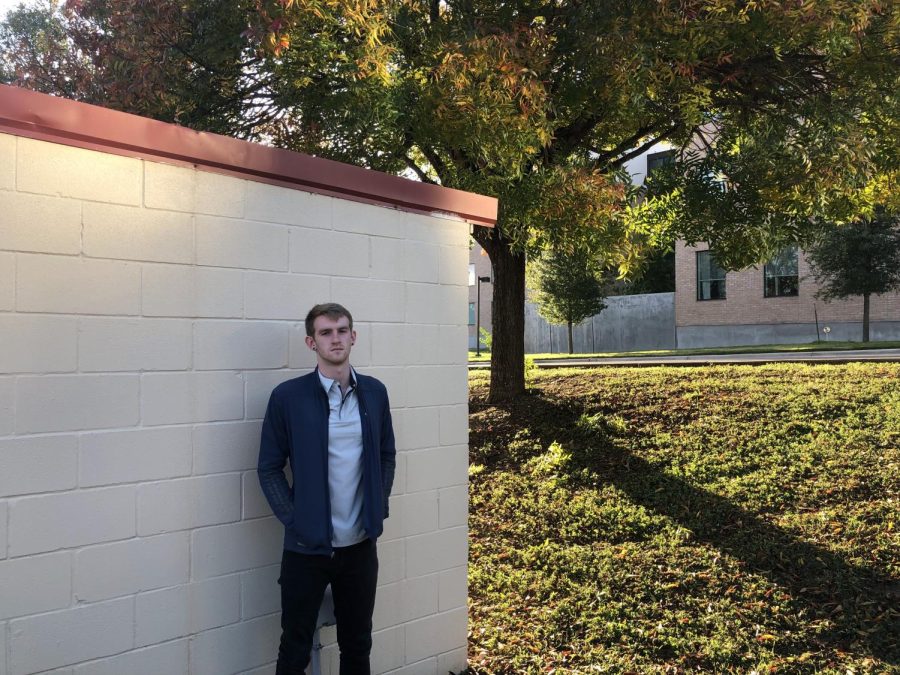St. Edward’s junior navigates self-discovery, life in America after returning to Austin
McKelvey is looking to find himself here in Austin. He is getting used to being back in America after his time back home in Kenya.
John McKelvey, a St. Edward’s junior, is looking for stability; giving new people his new phone number has become exhausting.
McKelvey grew up anchored in a safe, rural suburb in Nairobi, Kenya. He would hang out with his sisters, adventure with his friends around the neighborhood or play music with his bandmates.
“I didn’t like to leave home. I was very much a kid that needed to be dragged kicking and screaming to things outside my house, outside my neighborhood,” McKelvey said.
When McKelvey did get out of his neighborhood to take trips to places like the shopping mall, he was still pretty shy and didn’t like attention. He didn’t like feeling different from other people. He was unavoidably different, though: white in Kenya. For a while, curious looks from native Kenyans made him feel strange.
Still, he tried to be as polite as possible, something that he thinks has stuck with him from spending so much time with his best friend’s British family.
“I never wanted to be the rude ‘American guy’… almost to the point of having social anxiety about it,” McKelvey said.
However, McKelvey’s sister Meredith, who is two years older, felt that even life within their neighborhood could feel awkward sometimes.
“There was definitely a perceptible difference between us and the other kids who we grew up with…they kind’ve looked down on us,” Meredith McKelvey said. “That was hurtful as a child because we moved around a lot. When you’re not friends with the same people anymore, it can be difficult.”
There were only a few other English-speaking families who lived near the McKelveys outside of Nairobi. Most of the children were born into missionary families. When McKelvey’s Baptist missionary parents left the church when he was 8 years old because it was too conservative, his world shrunk.
Eventually, though, things changed. McKelvey entered a Christian, internationally representative high school. The student demographic felt more like him, and it was stable.
McKelvey’s mother, Amy McKelvey, said that this was a period of his life where he broke away from some of his shyness.
“In high school, he was a person that was able to mesh with different groups of people. But, he’s also always been attracted to people that march to the beat of their own drum,” said Amy McKelvey.
When the time came to apply for college, McKelvey’s high school friends were looking at universities across the world. So, so did McKelvey. Because he was a United States citizen, financial aid worked out and he enrolled in Pepperdine University in Los Angeles.
“Even though I’m technically an American, I didn’t really feel connected to the U.S. But going there was just easier than anything else,” McKelvey said.
After a freshman year at Pepperdine, he transferred to St. Edward’s University.
Now, trying to discover himself in Austin, McKelvey is less shy than reserved. When he keeps to himself, he takes time in the morning to journal his days down to the moment. To remember the details of days and places in his past he keeps a memory box, too, filled with his favorite items. He’s quite good at compartmentalizing to deal with emotions, noted his sister Meredith.
“Our life around us could be like Chernobyl, but he’s still going to keep his composure.”
McKelvey’s life could be like Chernobyl today, but he probably won’t let on. It’s difficult for him to express his experiences through words that any American would understand, so he might text them to a friend from his time in Kenya. He’s gotten really good at texting, he thinks.
He had to switch the SIM card on his phone when he returned to the U.S. a few times because his plan expired, which has exhaustingly complicated texting. Nevertheless, McKelvey is unrelentingly, quietly marching to the beat of his own sentimental drum and continues to text.
“Coming from a culture that’s a little bit quiet and nuanced in Kenya to a culture that’s more expressive and individualistic in the U.S., it’s easy to get lost,” said Meredith.
I met McKelvey later on the same day that I interviewed him, this time at a Halloween-themed party, purely coincidentally. He was wearing a sweater, but it was warm enough in the kitchen where we socialized that he could take it off.
He looked for a place where he could leave the sweater and still remember it: inside of a cabinet, beneath the sink, on top of a few plates. An odd place for a sweater.
His choice for where to put the sweater took a minute. It was deliberate. Amidst a noisy, crowded party full of expressive individuals, halfway across his world, it’d be easy for a quiet, nuanced sweater to get lost. He wasn’t going to lose it, though. It was an important sweater. He wasn’t going to lose it.







